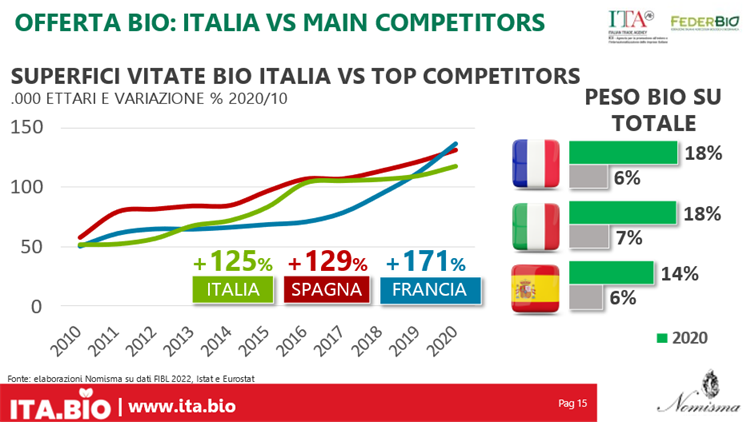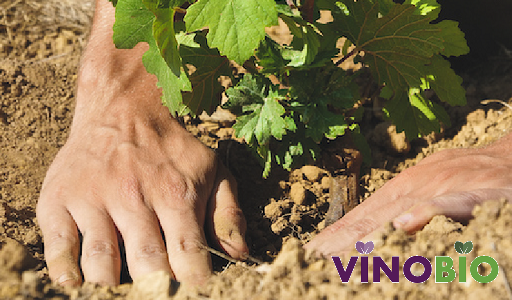Organic area under vine continues to grow and among the leading European producers in terms of organic’s weight in the total tripled in 10 years. This is what emerges from VINOBIO. the online platform of data and information for the internationalization of Made in Italy organic wine curated by Nomisma and promoted by ICE Agency and FederBio.
Organic wine is a phenomenon, at least on the production front, that is all-European: in this scenario, with 126,000 hectares of organic vines in 2021, Italy holds the record for incidence of organic vineyard area (21% of the total). However, European competition is fierce, so much so that in the space of a decade, organic areas in Italy have grown by +141% (2020 vs. 2010) compared to +148% in Spain and as much as +218% in France.
The role of Italian organic wine in international markets is also relevant: 626 million euros the value of Italian organic wine exports in 2022 according to Nomisma estimates (+18% compared to 2021) and a weight on total Italian wine exports (organic + conventional) of 8%.
 Organic wine currently accounts for 19 percent of the global export of Italian organic agribusiness. It is distinguished by high quality that combines territorial identity, given by designations of origin, with organic certification that attests to the choice to produce sustainably to protect soil fertility, biodiversity, in the fight against climate change.
Organic wine currently accounts for 19 percent of the global export of Italian organic agribusiness. It is distinguished by high quality that combines territorial identity, given by designations of origin, with organic certification that attests to the choice to produce sustainably to protect soil fertility, biodiversity, in the fight against climate change.
Regarding the markets covered, the latest survey conducted by Nomisma for ICE Agenzia and FederBio on 110 Italian wine companies showed that Germany is by far the main destination market for our organic wine (67 percent of companies indicate it as the first reference market), followed by the Scandinavian countries (61 percent). Outside the EU borders, Switzerland, the United States and the United Kingdom take the lead, followed by Canada and Japan.
If we then go and look at consumer interest in organic-branded wines, we can see that the potential demand is truly enormous and involves all the world’s major markets. Testifying to this are the results of two surveys that Nomisma has conducted in the last three months on Scandinavian and Japanese consumers with the aim of mapping wine consumption behavior and the potential of organic and the organic/Made in Italy pair on each market.
Source: Nomisma per piattaforma VINO.BIO – www.ita.bio – ICE Agenzia and FederBio
VINOBIO, the first platform dedicated to Italian organic wine in the world, represents an important support tool for companies aiming to start or consolidate their positioning in this market segment by providing useful information and analysis to guide their commercial strategies.



